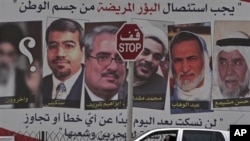Bahrain's king has ordered an early end to the state of emergency rule imposed to quell anti-government protests in the small Gulf nation.
Bahrain's state media said Sunday King Hamad al-Khalifa will lift the state of emergency on June 1, two weeks sooner than it was originally set to expire.
Bahrain imposed martial law in mid-March and invited troops from mainly Sunni-led neighboring states to help restrain the uprising by mostly Shi'ite protesters.
The announcement comes as at least 14 of 21 accused opposition leaders and political activists appeared in a special court to face charges of plotting to overthrow the monarchy. The government has arrested hundreds in the aftermath of the protests.
Meanwhile, Iranian Foreign Minister Ali Akbar Salehi is meeting senior officials in the United Arab Emirates Sunday, amid growing tensions between Iran and Gulf nations due to the unrest in Bahrain.
Iran, which is predominantly Shi'ite, has heavily criticized efforts by Bahrain's Sunni leaders to quell the unrest.
Details from Salehi's talks Sunday have not been released.
Last week, the Iranian foreign minister visited Qatar and Oman, two of the six-nations in the Gulf Cooperation Council (GCC) that also includes the UAE, Bahrain, Saudi Arabia and Kuwait.
Officials from the GCC will hold talks Tuesday in Saudi Arabia. The group strongly denounced Iran during their last meeting.
Bahraini officials have said 24 people died in the unrest.
Some information for this report was provided by AP, AFP and Reuters.















